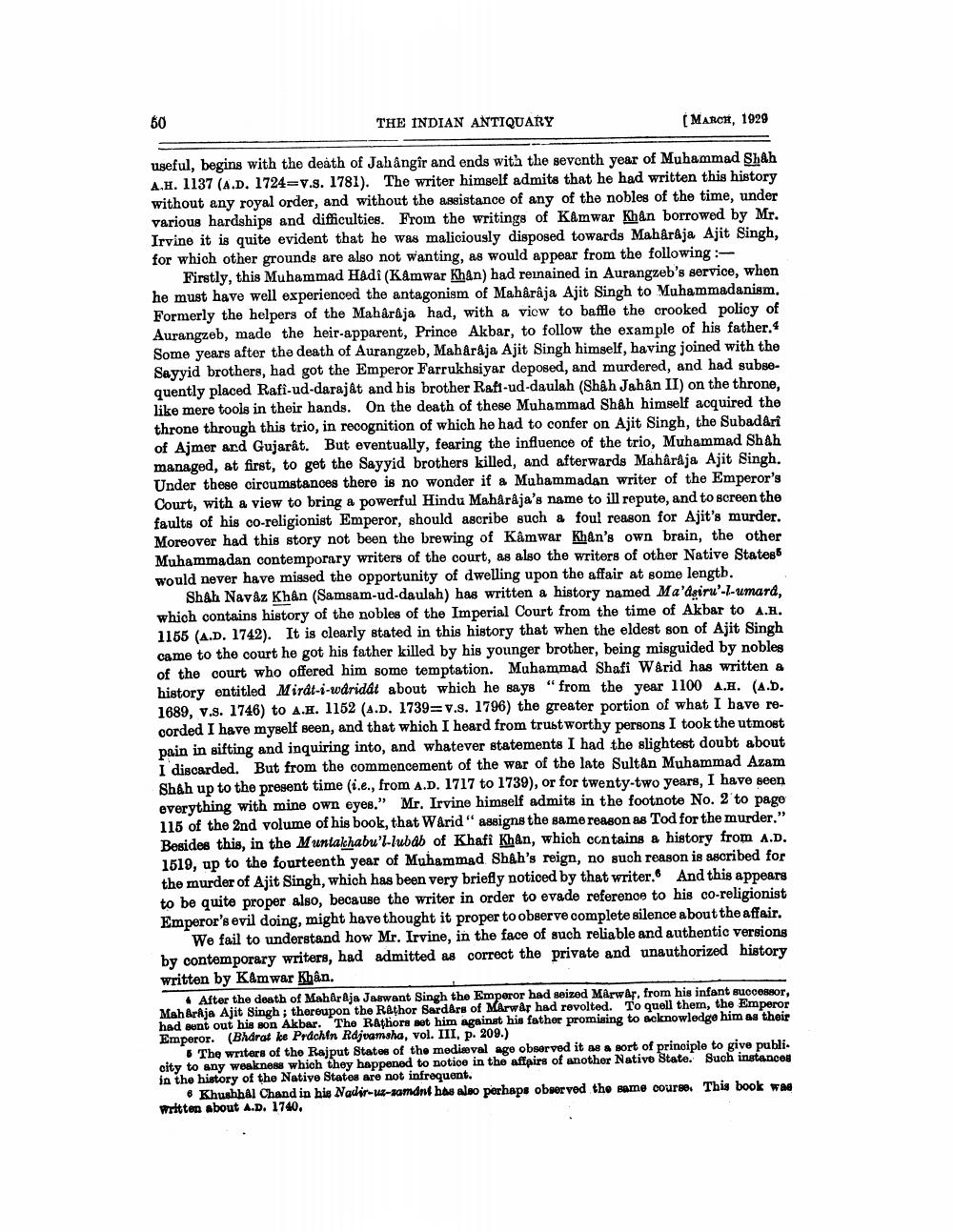________________
60
THE INDIAN ANTIQUARY
[MARCH, 1929
useful, begins with the death of Jahangir and ends with the seventh year of Muhammad Shah A.H. 1137 (A.D. 1724=V.s. 1781). The writer himself admits that he had written this history without any royal order, and without the assistance of any of the nobles of the time, under various hardships and difficulties. From the writings of Kamwar Khan borrowed by Mr. Irvine it is quite evident that he was maliciously disposed towards Mahâr&ja Ajit Singh, for which other grounds are also not wanting, as would appear from the following:
Firstly, this Muhammad Hadi (Kâmwar Khan) had reinained in Aurangzeb's service, when he must have well experienced the antagonism of Mahârâja Ajit Singh to Muhammadanism. Formerly the helpers of the Maharaja had, with a view to baffle the crooked policy of Aurangzeb, made the heir-apparent, Prince Akbar, to follow the example of his father, Some years after the death of Aurangzeb, Mahârâja Ajit Singh himself, having joined with the Sayyid brothers, had got the Emperor Farrukhsiyar deposed, and murdered, and had subsequently placed Rafi-ud-darajat and his brother Raft-ud-daulah (Shah Jahan II) on the throne, like mere tools in their hands. On the death of these Muhammad Shah himself acquired the throne through this trio, in recognition of which he had to confer on Ajit Singh, the Subadari of Ajmer ard Gujarât. But eventually, fearing the influence of the trio, Muhammad Shah managed, at first, to get the Sayyid brothers killed, and afterwards Maharaja Ajit Singh. Under these circumstances there is no wonder if a Muhammadan writer of the Emperor's Court, with a view to bring a powerful Hindu Maharaja's name to ill repute, and to screen the faults of his co-religionist Emperor, should ascribe such & foul reason for Ajit's murder. Moreover had this story not been the brewing of Kâmwar Khan's own brain, the other Muhammadan contemporary writers of the court, as also the writers of other Native States would never have missed the opportunity of dwelling upon the affair at some length.
Shah Navâz Khan (Samsam-ud-daulah) has written a history named Ma'dsiru'-l-umard, which contains history of the nobles of the Imperial Court from the time of Akbar to A.H. 1155 (A.D. 1742). It is clearly stated in this history that when the eldest son of Ajit Singh came to the court he got his father killed by his younger brother, being misguided by nobles of the court who offered him some temptation. Muhammad Shafi Warid has written & history entitled Mirdt-i-wdridát about which he says "from the year 1100 A.H. (A.D. 1689, v.g. 1746) to A... 1152 (A.D. 1739=v.s. 1796) the greater portion of what I have recorded I have myself seen, and that which I heard from trustworthy persons I took the utmost pain in sifting and inquiring into, and whatever statements I had the slightest doubt about I discarded. But from the commencement of the war of the late Sultan Muhammad Azam Shah up to the present time i.e., from A.D. 1717 to 1739), or for twenty-two years, I have seen everything with mine own eyes." Mr. Irvine himself admits in the footnote No. 2 to page 115 of the 2nd volume of his book, that Warid TM assigns the same reason as Tod for the murder." Besides this, in the Muntakhabu'l-lubab of Khafi Khan, which contains a history from A.D. 1519, up to the fourteenth year of Muhammad Shah's reign, no such reason is ascribed for the murder of Ajit Singh, which has been very briefly noticed by that writer. And this appears to be quite proper also, because the writer in order to evade referenoe to his co-religionist Emperor's evil doing, might have thought it proper to observe complete silence about the affair.
We fail to understand how Mr. Irvine, in the face of such reliable and authentic versions by contemporary writers, had admitted as correct the private and unauthorized history written by Kamwar Khân.
After the death of Maharaja Jaswant Singh the Emperor had seized Marwar, from his infant successor, Mah ArAja Ajit Singh; thoroupon the Rathor Sardars of Marwar had revolted. To quell them, the Emperor had sent out his son Akbar. The Rathors set him against his father promising to acknowledge him as their Emperor. (Bhdrat ke Prdchin Rdjuamsha, vol. III, p. 209.)
The writers of the Rajput States of the medieval age observed it as a sort of principle to give publi. city to any weakness which they happened to notioe in the aftpirs of another Native State. Such instances in the history of the Native States are not infrequent.
6 Khushbal Chand in his Nadir-uz-samdnt has also perhaps observed the same course. This book was Written about A.D. 1740.




